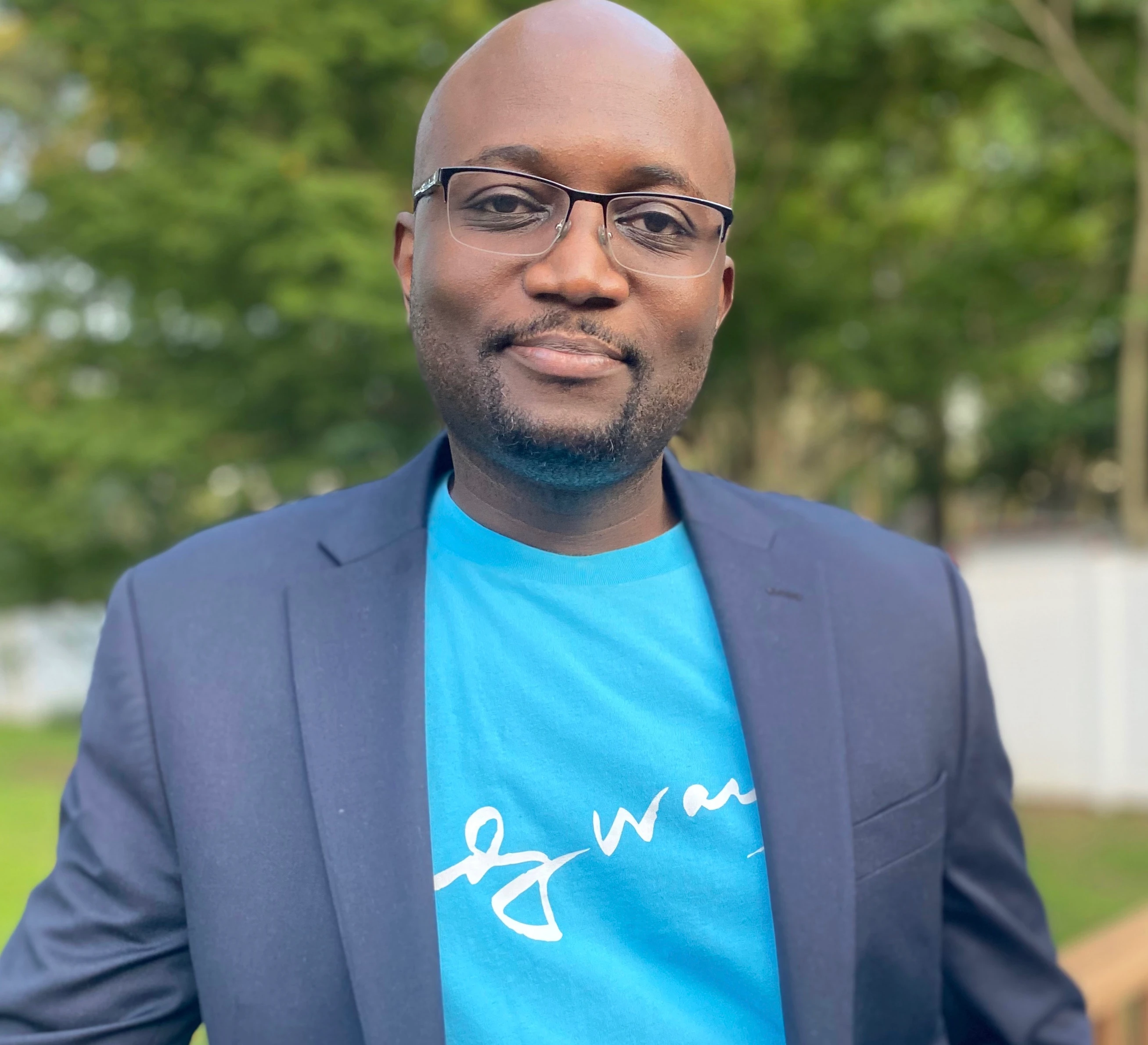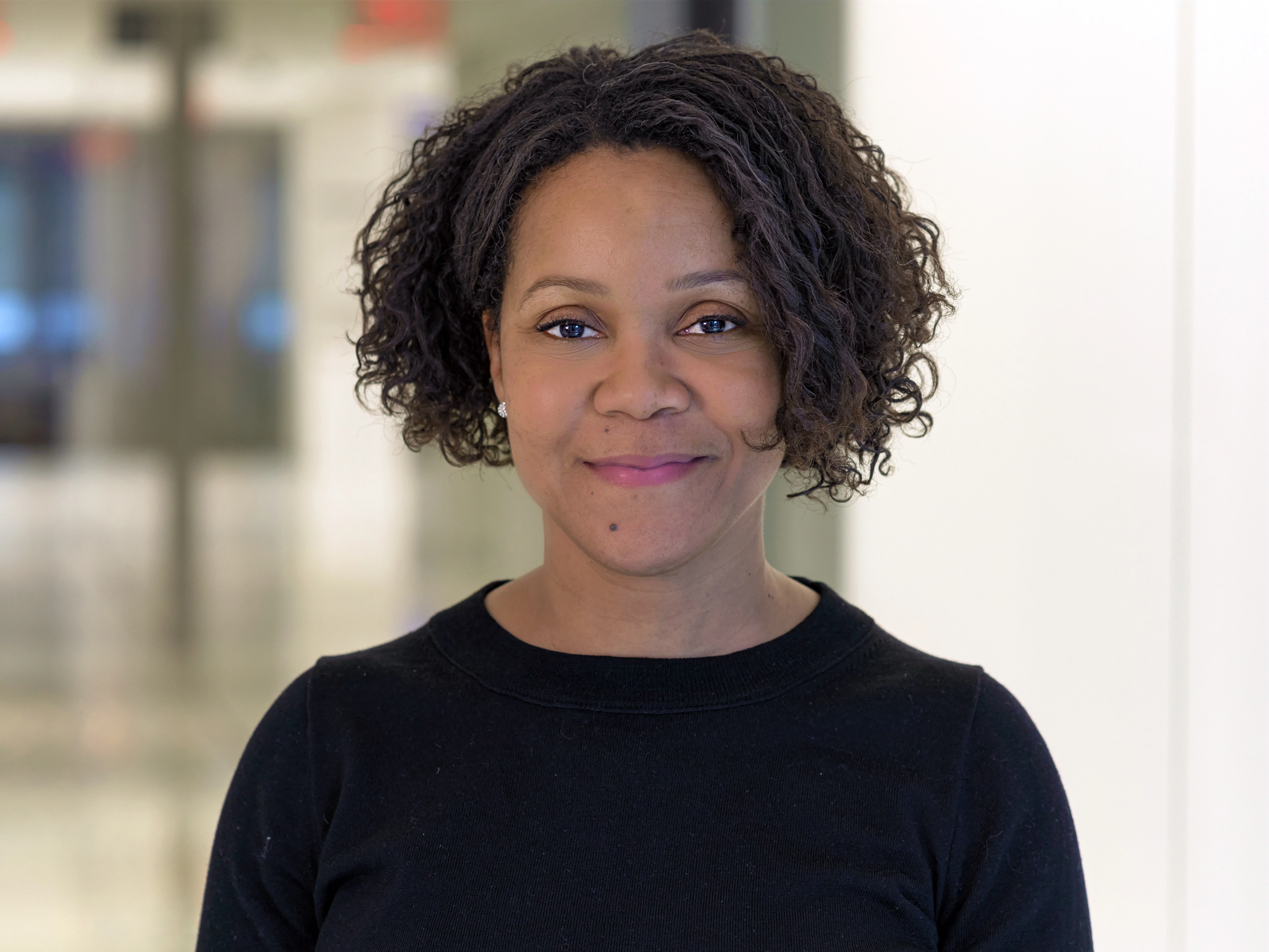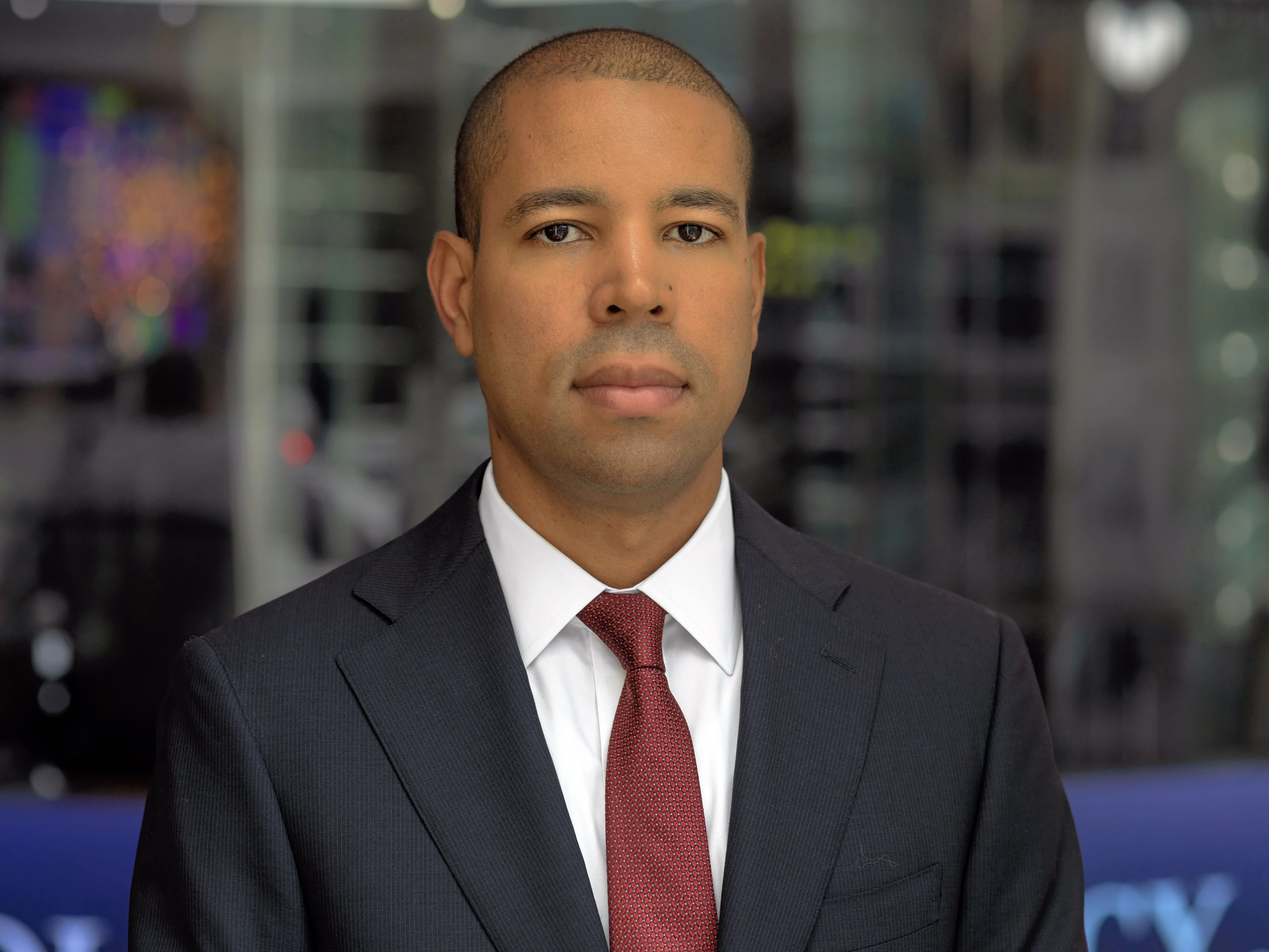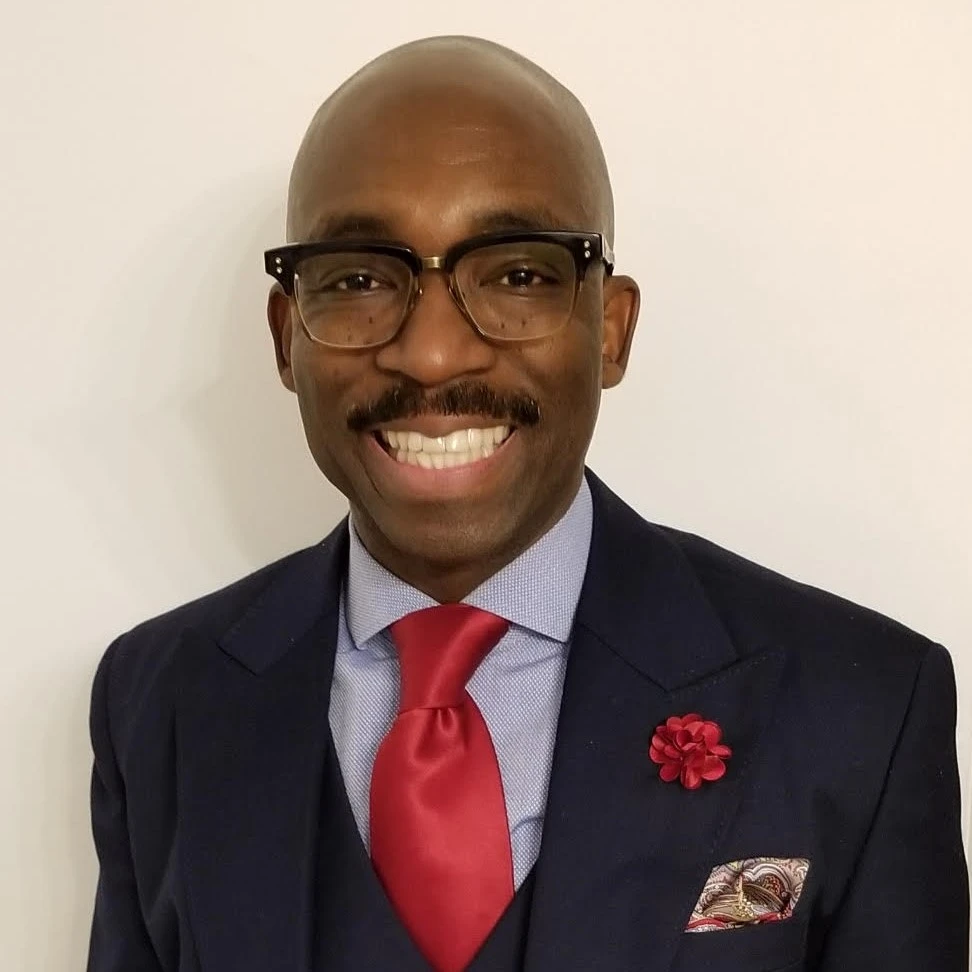4 Black technologists who have built their careers at Bloomberg
February 26, 2021
At Bloomberg, innovation comes to life as a result of our 6,500 engineers’ various perspectives, lived experiences, nationalities, genders, as well as ethnic and racial backgrounds. Our inclusive culture places a high value on diverse ideas and teams, which leads to the creation of more unlikely ideas, better decisions being made, and fast, collaborative action among our people.
These four Black technologists work in our Engineering and Global Data departments in New York City. Two of them graduated from Historically Black Colleges & Universities (HBCUs). Each of them has worked at Bloomberg for more than five years, and all of them have held different roles across the company as they’ve grown and advanced in their careers here.
Through our conversations, we explore their journey to Bloomberg and what they do here, how their careers have progressed as they’ve grown professionally, their interests and impact in the technology sector, why they believe an inclusive workplace is important, as well as their own efforts to bring more diverse talent to tech. Following an incredibly challenging year in the wake of the murders of George Floyd, Breonna Taylor, and Ahmaud Aubrey, we also asked them what has, hasn’t, and still needs to change in the workplace with regards to racial justice. Interviews were edited for length and clarity.


Evens Jean
Engineering Team Leader for AIM Valuations Workflows
How did you get to Bloomberg? What do you work on now?
I joined Bloomberg in 2013, after working in tech in the Baltimore area for a couple of years. I learned of the position purely by luck; it popped up on my LinkedIn page as I was browsing around. As they say, the rest is history…
Since joining the company, I have worked on various products within Asset & Investment Manager (AIM) Engineering in support of our clients’ trading activities. The Valuations Workflows team maintains the Cash Management system within AIM, which tracks the impact of trades and position lifecycle events on clients’ portfolios.
Did you have any mentors or influential managers to guide your career along the way?
When I joined Bloomberg, I did not think of actively seeking a formal mentor. However, I have informally leveraged my network to help guide my career. One key piece of advice that has stuck with me since my early days is “your career at Bloomberg is what you make of it.” This has driven home the point for me that I needed to take charge of my career development. It has led me to take more risks, to raise my hand and ask to be part of projects, and to design discussions that I found to be in line with my professional aspirations. It also pushed me to get more involved in other activities across the company, such as recruiting and Best of Bloomberg (BOB) volunteer events, which I credit for setting the foundation for my becoming a co-lead of Bloomberg’s Black In Tech (BBIT) community.
What do you love most about working in tech?
As a student at heart, I have an insatiable thirst for solving complex problems. Working in tech is a dream come true for me, as it offers unique opportunities to solve real-life problems — be it through machine learning or the introduction of complex hardware, algorithms, or designs.
In health, education, and finance, technology allows developers to coordinate with experts in various fields and to introduce solutions that support the rapid analysis of information, which leads to insightful decisions. Furthermore, the field is constantly changing, offering lots of potential for continuous learning. There are always opportunities to learn about new tools and techniques.
Given the dynamic nature of the field and the fact that it permeates all facets of life, there are endless opportunities for one to innovate and challenge the status quo.
Are there any particular technologies that interest you?
I chose to work in tech primarily because of the constant opportunity to solve challenging problems. This is especially true in the environment at Bloomberg. However, I also get excited about my career in tech when I think about the promise of ubiquitous computing and how it integrates seamlessly into every aspect of our daily lives.
It is indescribable to be part of such a dynamic field, where new solutions, tools, algorithms are being introduced every day — all with the intent of improving our quality of life or supporting complex analysis. So, are there any particular technologies that interest me? For me, it’s whatever technology is most applicable to the current problem at hand. So, I am really interested in taking it all in and am always seeking to learn about new technologies whenever time permits.
What are some of the unique challenges that people of color face getting into tech / within the tech industry?
Representation is one of the most significant challenges faced by people of color in the tech industry. The lack of representation means there are few role models to inspire and mentors to serve as guides.
Representation impacts peer learning as well. As a graduate student, I was lucky enough to have other Black students in the program with me and that made a world of difference. We relied on each other for support, because none of us had access to mentors — within the program or otherwise — who could guide our steps.
Another downside to the lack of representation is that one can succumb to the idea that you represent your whole group. As a result of this hypervisibility, you may feel your successes are undeserved and your failures are further proof that your group is incapable of performing at a high level. This extra burden on the psyche is part of the emotional tax that comes with being Black in tech, something that can be detrimental to professional growth and success. Without greater representation, even talented people of color can suffer from imposter syndrome and put undue pressure on themselves, leading to failure or burnout.
In light of the heightened awareness of / discussion about racial justice in the workplace since last summer, what’s changed? What hasn’t? What still needs to change?
The heightened focus on racial justice has certainly changed the landscape. There are fewer people on the sideline, and more people have stopped turning a blind eye to the issue at hand. There is less of a need to explain the state of things. Instead, most of the discussion has shifted to strategizing about solutions.
There have been many pledges from individuals and companies alike, making the promise of a brighter future seems more realistic. However, accountability will be key to getting us there, so things like indexing or other forms of measurement are needed across the board. Bloomberg and other media/data companies will play a key role in tracking the numbers and the improvements at different organizations, to ensure these pledges are met.
In your opinion, why are diversity and inclusion important? How do you personally promote diversity and inclusion with your teams and/or in the community?
The most prized asset of any company is its employees. They are the driving force behind any success. Diversity and inclusion are about investing in the employees, ensuring that they remain engaged at work and can develop a growing sense of belonging — of community. The BBIT community aims at providing that space within Bloomberg for Black technologists and allies to build their networks and remain engaged.
As one of the co-founders of BBIT, I am always amazed at the level of engagement and enthusiasm that exists in our community chat. The energy in the chat is almost palpable, regardless of the virtual environment in which we are now operating. This gives me great hope for any current or future BBIT members who are looking for that sense of belonging.
“The BBIT community aims at providing that space within Bloomberg for Black technologists and allies to build their networks and remain engaged.”
– Evens Jean


Jennifer Salaam
Team Leader, Global Agile team
How did you get to Bloomberg? What do you work on now?
My long road started at Howard University, took me to San Francisco and back to New York as a software engineer, and on to managing a team of project managers. A recruiter contacted me about a role working with the Instant Bloomberg (IB) team at Bloomberg that sounded interesting. It was beyond interesting! I found a solid team of engineers and team leaders who were committed to the product and its clients. They were up to the challenges that I threw at them and even tossed some back at me.
What do you work on now?
I am now the Team Leader of the Global Agile team. My job and the job of my team are to work across the organization and to help teams build better software and collaborate better by embracing the principles of agility.
You graduated from an HBCU. Why should HBCU students consider a job/career at Bloomberg?
It is a great place to launch your career. Our Engineering new hire program is pretty solid, and the Bloomberg Black In Tech (BBIT) community is a great support system.
Did you have any mentors or influential managers to guide your career along the way?
I was fortunate enough to have a couple of career-defining managers who were also mentors. They gave me tough advice when I least wanted to hear it, demonstrated how to use humor to navigate tricky situations, and volunteered me for things I didn’t think I was ready for.
What do you love most about working in tech?
No day is exactly the same! There are endless opportunities to build your skills, challenge yourself, and there’s a rush that comes with seeing people using a product that you helped create.
Are there any particular technologies that interest you?
While coding isn’t a part of my day job anymore, I spend a few off-hours a week trying to keep my skills sharp – mostly in Python and data science.
What are some of the unique challenges that people of color face getting into tech / within the tech industry?
Speaking as a Black woman, it’s an incredibly challenging space. You’re not male and you’re not white and there aren’t tons of role models. Opportunities to learn about the field of technology and computer science are sometimes limited, and the same is true with internship opportunities.
Once you land a job, then it’s all about learning to navigate the workplace and build a career – usually at the same time. That’s where mentoring and a solid network can make a difference. I’m incredibly proud of the work that Bloomberg’s Black in Tech community is doing to build a strong, supportive group that is working to help grow the next generation of talent.
In light of the heightened awareness of / discussion about racial justice in the workplace since last summer, what’s changed? What hasn’t? What still needs to change?
For better or worse, the level of honesty in our conversations is what I’ve noticed the most. There’s still a fair amount of disagreement on many topics, but people are at least being honest about it, which I appreciate.
I believe many people are unsure about what all this means for the workplace and how one can go about putting inclusion and racial justice into action. I’d like to see more leaders across business organizations acknowledge this, join forces to figure it out and do the work.
In your opinion, why are diversity and inclusion important? How do you personally promote diversity and inclusion with your teams and/or in the community?
The answer to this should be obvious, but the best collaborations (and sometimes the hardest) occur when people challenge your thinking, broaden your perspective, and actively encourage you to bring your authentic self to the game. This can be scary, but it’s been a recipe for growth for me, and it’s produced some really good albums!
How do you personally promote diversity and inclusion with your teams and/or in the community?
I do the work and let those efforts speak for themselves. Sometimes they get noticed; most of the time, they do not! I volunteer locally and at Bloomberg using whatever resources and skills are available to me at the time. My advice is to put whatever skills you have to work. You’ll be surprised how much they are needed and appreciated.
“For better or worse, the level of honesty in our conversations is what I’ve noticed the most. There’s still a fair amount of disagreement on many topics, but people are at least being honest about it, which I appreciate.”
– Jennifer Salaa


Christian Nikolay
Americas Head of Research Contribution
How did you get to Bloomberg? What do you work on now?
I joined Bloomberg in London as a Global Product Manager for Equity Sales & Trading Applications. I had spent 10 years before that working for a global bank in New York and London. In my current role as Head of Research Contribution for the Americas in our Global Data Department, I manage the distribution flow of research and fundamental data from brokers into Bloomberg. This content then becomes part of the foundational dataset that is available to Bloomberg Terminal users to complement their investment processes.
You graduated from Howard University. Why should HBCU students consider a job/career at Bloomberg?
It’s an opportunity to extend your educational learning into a structured fundamental training environment within a global company that sits at the intersection of tech and the financial markets. Bloomberg provides a growth environment in which new graduates can expand their foundational professional skills. It is also an opportunity to assume practical responsibility early in your career.
Did you have any mentors or influential managers to guide your career along the way?
I have had mentors/sponsors from the early days in my recruiting, internships, and throughout my global professional careers. They were instrumental in helping me sustain my early career progressions, international relocations, and lateral industry moves.
What do you love most about working in tech?
I love being close to constant innovation and figuring out how to apply it to my job. Tech is a very dynamic environment, where there is always something new to learn.
Are there any particular technologies that interest you?
I am interested in natural language processing (NLP) and artificial intelligence (AI), especially how these technologies can quickly crystalize large datasets into simply framed insights.
What are some of the unique challenges that people of color face getting into tech / within the tech industry?
It starts with the lack of basic access to learning and technology resources. Then, when they finally start looking for jobs in the industry, they sometimes encounter legacy hiring practices and screening processes that are exclusionary.
In light of the heightened awareness of / discussion about racial justice in the workplace since last summer, what’s changed? What hasn’t? What still needs to change?
The level of awareness about racial justice has certainly changed and we are seeing a sustained level of discussion about this topic in the workplace and beyond. That being said, there needs to be a greater focus on investments and performance tied to sustained diversity goals and a greater emphasis on data in understanding diversity within organizations. In addition, representation among management in corporate America remains low.
In your opinion, why are diversity and inclusion important? How do you personally promote diversity and inclusion with your teams and/or in the community?
Capturing and sustaining the essence of our clients’ needs requires a diverse representation of talent in the product idea generation and design process.
As a participant in the recruiting and hiring process at Bloomberg, I am regularly presented with a broad range of diverse candidates to interview. I also am involved with recruiting events related to HBCUs. I also mentor and sponsor Black professionals and organize Black professional networking forums for our clients.
“The level of awareness about racial justice has certainly changed and we are seeing a sustained level of discussion about this topic in the workplace and beyond. That being said, there needs to be a greater focus on investments and performance tied to sustained diversity goals and a greater emphasis on data in understanding diversity within organizations.”
– Christian Nikolay


Kerry Joseph
Engineering Team Leader, Breaking News Tools
How did you get to Bloomberg?
I joined Bloomberg right out of college 20 years ago. I went to school in the Midwest and wanted to work closer to home, so I accepted an interview for a financial tech firm through a recruitment agency, and it turned out to be Bloomberg.
What do you work on now?
I am currently the Team Leader for the Breaking News Tools group. Our team of engineers builds the tools that Bloomberg News editors and reporters use globally to create market-moving content. We work with the Bloomberg newsroom to ensure that our clients have up-to-the-minute information so they can make critical decisions.
Did you have any mentors or influential managers to guide your career along the way?
Throughout my career here, I’ve had the privilege to work with many amazing and talented people. Two who stand out are Melita Chang and Chris Dovener. Throughout the years, Melita has helped me appreciate the need to own my career and to be very deliberate in what choices I make and when to execute those choices. Chris was very influential in helping me understand the need to pay attention to where I currently am, but also to where I want to go in the future. He also encouraged me to be courageous and to take advantage of new opportunities as they become available to me.
What do you love most about working in tech?
My first team leader at Bloomberg would always say, “The only thing that stays the same at Bloomberg is that everything changes.” What I love the most is the excitement and fun that comes from working on the next challenging problem, and using the latest technology to completely refactor a solution, making it faster, better, or less expensive to operate.
Are there any particular technologies that interest you?
Of late, I have been interested in technologies that improve observability. Being able to tell not just when something is broken, but also what and why it is broken, is a huge challenge for complex systems. There have been great advancements in this field of technology, making it much easier to do what was extremely cumbersome just a few years ago.
What are some of the unique challenges that people of color face getting into tech / within the tech industry?
There is a difference between fitting in and fitting together. Fitting in implies acting like everyone else and not being your authentic self. Fitting together allows diverse people to coalesce and still maintain their authenticity. People of color are often asked to fit in but are unable to fit together in the tech industry.
In light of the heightened awareness of / discussion about racial justice in the workplace since last summer, what’s changed? What hasn’t? What still needs to change?
There is now a safer space to hold discussions about these subjects. The core issues have not changed significantly, but the increase in communication allows for greater visibility and collaboration to make improvements.
In your opinion, why are diversity and inclusion important?
Diversity and inclusion allow for the greatest variety of ideas and perspectives. This variety is essential to the continued success of any organization. You cannot cook with the same exact recipe and expect the food served to taste differently. Similarly, we should not expect that the same approach, the same thinking, and the same perspectives will generate different solutions to the same problems. The reality is that we are continuing to look for better solutions to existing problems, while constantly being confronted with new problems. Diversity gives us the greatest chance to produce the best possible solutions.
How do you personally promote diversity and inclusion with your teams and/or in the community?
11 years ago, I had the opportunity to be the first captain of the recruitment team at Howard University. This was Bloomberg’s first effort to recruit at a Historically Black College & University (HBCU). Since then, it has been exciting to see the creation of numerous diverse tech communities within Bloomberg, such as Bloomberg Black In Tech (BBIT), as well as formal mentorship programs for engineers from various backgrounds. As a BBIT member and a mentor, I support these community-wide initiatives, as well as continue to look for opportunities to hire engineers from all backgrounds.
“…it has been exciting to see the creation of numerous diverse tech communities within Bloomberg, such as Bloomberg Black In Tech (BBIT), as well as formal mentorship programs for engineers from various backgrounds.”
– Kerry Joseph